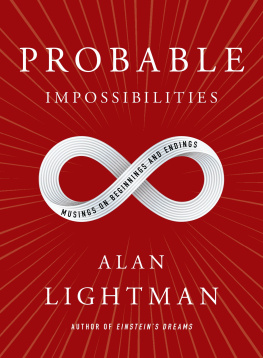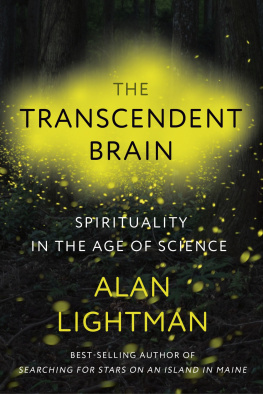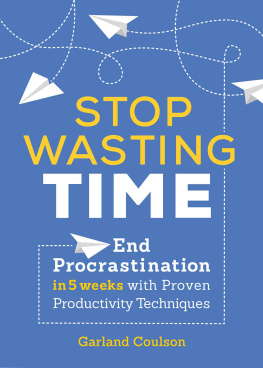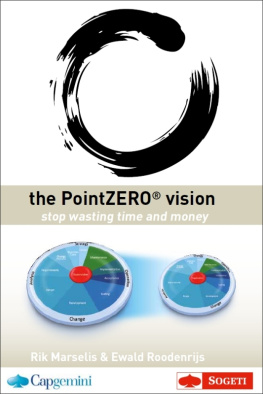Also by Alan Lightman
The Accidental Universe: The World You Thought You Knew
Einsteins Dreams
Song of Two Worlds
The Diagnosis: A Novel
The Discoveries: Great Breakthroughs in 20th-Century Science, Including the Original Papers
A Sense of the Mysterious: Science and the Human Spirit
Ancient Light: Our Changing View of the Universe
Origins: The Lives and Worlds of Modern Cosmologists
Reunion: A Novel
Mr g: A Novel
Good Benito: A Novel
Screening Room: A Memoir

First published in Great Britain by Simon & Schuster UK Ltd, 2018
A CBS COMPANY
www.SimonandSchuster.com
Copyright Alan Lightman, 2018
The right of Alan Lightman to be identified as the author of this work has been asserted in accordance with the Copyright, Designs and Patents Act, 1988.
First TED Books hardback edition May 2018
TED, the TED logo and TED Books are trademarks of TED Conference, LLC. TED BOOKS and colophon are registered trademarks of TED Conferences, LLC.
For more information on licensing the TED talk that accompanies this book, or other content partnerships with TED, please contact .
Simon & Schuster UK Ltd
1st Floor
222 Grays Inn Road
London WC1X 8HB
www.simonandschuster.co.uk
www.simonandschuster.com.au
www.simonandschuster.co.in
Simon & Schuster Australia, Sydney
Simon & Schuster India, New Delhi
The author and publishers have made all reasonable efforts to contact copyright-holders for permission, and apologise for any omissions or errors in the form of credits given. Corrections may be made to future printings.
A CIP catalogue record for this book is available from the British Library
Hardback ISBN: 978-1-4711-6859-8
eBook ISBN: 978-1-4711-6860-4
Illustrations by Dola Sun
Interior design by MGMT.design
To Bruce, Sheila, Ken, Mark, Gretchen, Michael, Asia, and my other friends in Alaska who have helped me waste time in the most wonderful way
CONTENTS
A Village in Cambodia
Not long ago, I found myself in a small village in a remote area of Cambodia. Many rural areas in the world have modern plumbing, electric ovens, satellite TVs, and other such technological conveniences, but not this one. The inhabitants of Tramung Chrum live in one-room huts without electricity or running water. Dangling light bulbs in the huts are powered by car batteries. Food is cooked over open fires. The villagers support themselves by growing rice, watermelons, and cucumbers. Their religion is a version of moderate Islam, called Imam San Cham, combined with animism. When someone needs healing, the villagers perform a ceremony in which they summon the spirits of ancestors, monkeys, and horses. The ghosts inhabit the bodies of the villagers, who dance wildly through the night. Other than these moments, the villagers go about their lives in quiet calm. They rise with the sun. After breakfast, they herd their cows out for grazing, then walk to the rice fields and tend to their crops. They return to their huts as the light starts to dim and gather firewood for cooking the evening meal.
Each morning, the women ride their bicycles on a rutted red dirt road to a market ten miles away to trade for goods and food they cannot grow themselves. Through a translator, I asked one of the women how long the daily trip took. She gave me a puzzled look and said, I never thought about that.
I was startled at her disinterest in time. And envious. We in the developed world have created a frenzied lifestyle in which not a minute is to be wasted. The precious twenty-four hours of each day are carved up, dissected, and reduced to ten-minute units of efficiency. We become agitated and angry in the waiting room of a doctors office if weve been sitting for ten minutes or more. We grow impatient if our laser printers dont spit out at least five pages per minute. And we must be connected to the grid at all times. We take our smartphones and laptops with us on vacation. We go through our email at restaurants. Or our online bank accounts while walking in the park. The teenagers I know (and some of their parents) check their smartphones at least every five minutes of their free waking hours. At night, many sleep with their phones on their chests or next to their beds. When the school day ends, our children are loaded with piano lessons and dance classes and soccer games and extra language classes. Our university curricula are so crammed that our young people dont have time to digest and reflect on the material they are supposed to be learning.
I plead guilty myself. If I take the time to examine my own twenty-four hours per day, heres what I find: from the instant I open my eyes in the morning until I turn out the lights at night, I am at work on some project. First thing in the morning, I check my email. For any unexpected opening of time that appears during the day, I rush to patch it, as if a tear in my trousers. I find a project, indeed I feel compelled to find a project, to fill up the hole. If I have an extra hour, I can work at my laptop on an article or class lesson. If I have a few minutes, I can answer a letter or read an online news story. With only seconds, I can check phone messages. Unconsciously, without thinking about it, I have subdivided my day into smaller and smaller units of efficient time use, until there are no holes left, no breathing spaces remaining. I rarely goof off. I rarely follow a path that I think might lead to a dead end. I rarely waste time. And certainly, I would never ever spend a couple of hours of each day going to the market without knowing exactly how long the trip took and figuring out how to listen to an audiobook on the way.
Its not only me. All around me, I feel a sense of urgency, a vague fear of not being plugged in, a fear of not keeping up. I feel like Josef K. in Kafkas The Trial , who lives in a world of ubiquitous suspicion and powerful but invisible authority. Yet there is no authority here, only a pervasive mentality.
I can remember a time when I did not live in this way. I can remember those days of my childhood when I would slowly walk home from school by myself and take long detours through the woods. With the silence broken only by the sound of my own footsteps, I would follow turtles as they lumbered down a dirt path. Where were they going, and why? I would build play forts out of fallen trees. I would sit on the banks of Cornfield Pond and waste hours watching tadpoles in the shallows or the sway of water grasses in the wind. My mind meandered. I thought about what I wanted for dinner that night, whether God was a man or a woman, whether tadpoles knew they were destined to become frogs, what it would feel like to be dead, what I wanted to be when I became a man, the fresh bruise on my knee. When the light began fading, I wandered home.
I ask myself: What happened to those careless, wasteful hours at the pond? How has the world changed? Of course, part of the answer is simply that I grew up. Adulthood undeniably brings responsibilities and career pressures and a certain awareness of the weight of life. Yet that is only part of what has happened. Indeed, an enormous transformation has occurred in the world from the 1950s and 60s of my youth to today. A transformation so vast that it has altered all that we say and do and think, yet often in ways so subtle and ubiquitous that we are hardly aware of them. Among other things, the world today is faster, more scheduled, more fragmented, less patient, louder, more wired, more public. For want of a better phrase, I will call this world the wired world. By this term, I do not mean only digital communication, the Internet, and social media. I also mean the frenzied pace and noise of the world.
Next page







